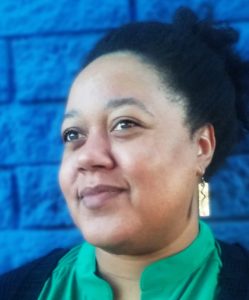 As a FUSE Executive Fellow, Stacy Cumberbatch (2019-20) worked with the Riverside County Economic Development Agency to develop an Opportunity Zone strategy that would lay the groundwork for an investment ecosystem that could effectively serve the local community. She is now the Founder and Managing Director of Blended Impact, a venture development firm that operates at the intersection of venture capital and economic development. The firm seeks to invest across asset classes in both tech and real estate and provide hands-on technical assistance via their innovation lab for their partners, including founders, developers, philanthropy, local government, and others.
As a FUSE Executive Fellow, Stacy Cumberbatch (2019-20) worked with the Riverside County Economic Development Agency to develop an Opportunity Zone strategy that would lay the groundwork for an investment ecosystem that could effectively serve the local community. She is now the Founder and Managing Director of Blended Impact, a venture development firm that operates at the intersection of venture capital and economic development. The firm seeks to invest across asset classes in both tech and real estate and provide hands-on technical assistance via their innovation lab for their partners, including founders, developers, philanthropy, local government, and others.


From Investment Ecosystem Groundwork to Venture Development
November 16, 2021  As a FUSE Executive Fellow, Stacy Cumberbatch (2019-20) worked with the Riverside County Economic Development Agency to develop an Opportunity Zone strategy that would lay the groundwork for an investment ecosystem that could effectively serve the local community. She is now the Founder and Managing Director of Blended Impact, a venture development firm that operates at the intersection of venture capital and economic development. The firm seeks to invest across asset classes in both tech and real estate and provide hands-on technical assistance via their innovation lab for their partners, including founders, developers, philanthropy, local government, and others.
As a FUSE Executive Fellow, Stacy Cumberbatch (2019-20) worked with the Riverside County Economic Development Agency to develop an Opportunity Zone strategy that would lay the groundwork for an investment ecosystem that could effectively serve the local community. She is now the Founder and Managing Director of Blended Impact, a venture development firm that operates at the intersection of venture capital and economic development. The firm seeks to invest across asset classes in both tech and real estate and provide hands-on technical assistance via their innovation lab for their partners, including founders, developers, philanthropy, local government, and others.
 As a FUSE Executive Fellow, Stacy Cumberbatch (2019-20) worked with the Riverside County Economic Development Agency to develop an Opportunity Zone strategy that would lay the groundwork for an investment ecosystem that could effectively serve the local community. She is now the Founder and Managing Director of Blended Impact, a venture development firm that operates at the intersection of venture capital and economic development. The firm seeks to invest across asset classes in both tech and real estate and provide hands-on technical assistance via their innovation lab for their partners, including founders, developers, philanthropy, local government, and others.
As a FUSE Executive Fellow, Stacy Cumberbatch (2019-20) worked with the Riverside County Economic Development Agency to develop an Opportunity Zone strategy that would lay the groundwork for an investment ecosystem that could effectively serve the local community. She is now the Founder and Managing Director of Blended Impact, a venture development firm that operates at the intersection of venture capital and economic development. The firm seeks to invest across asset classes in both tech and real estate and provide hands-on technical assistance via their innovation lab for their partners, including founders, developers, philanthropy, local government, and others.